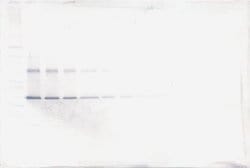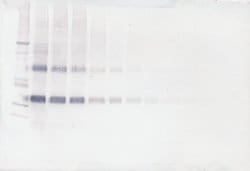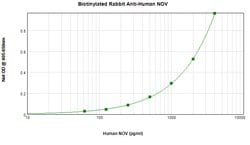Learn More
PeproTech NOV Polyclonal Antibody, Biotin, PeproTech®, Invitrogen™

Description
AA Sequence of recombinant protein: MQVAATQRCP PQCPGRCPAT PPTCAPGVRA VLDGCSCCLV CARQRGESCS DLEPCDESSG LYCDRSADPS NQTGICTAVE GDNCVFDGVI YRSGEKFQPS CKFQCTCRDG QIGCVPRCQL DVLLPEPNCP APRKVEVPGE CCEKWICGPD EEDSLGGLTL AAYRPEATLG VEVSDSSVNC IEQTTEWTAC SKSCGMGFST RVTNRNRQCE MLKQTRLCMV RPCEQEPEQP TDKKGKKCLR TKKSLKAIHL QFKNCTSLHT YKPRFCGVCS DGRCCTPHNT KTIQAEFQCS PGQIVKKPVM VIGTCTCHTN CPKNNEAFLQ ELELKTTRGK M. Preparation: Produced from sera of rabbits immunized with highly pure Recombinant Human NOV. Anti-Human NOV-specific antibody was purified by affinity chromatography and then biotinylated. Sandwich ELISA: To detect hNOV by sandwich ELISA (using 100 μL/well antibody solution) a concentration of 0.25-1.0 μg/mL of this antibody is required. This biotinylated polyclonal antibody, in conjunction with PeproTech Polyclonal Anti-Human NOV (500-P257) as a capture antibody, allows the detection of at least 0.2-0.4 ng/well of Recombinant hNOV. Western Blot: To detect hNOV by Western Blot analysis this antibody can be used at a concentration of 0.1-0.2 μg/mL. Used in conjunction with compatible secondary reagents the detection limit for Recombinant hNOV is 1.5-3.0 ng/lane, under either reducing or non-reducing conditions 500-P257BT-1MG will be provided as 2 x 500 μg

Specifications
Specifications
| Antigen | NOV |
| Applications | ELISA, Western Blot |
| Classification | Polyclonal |
| Concentration | 0.1-1.0 mg/mL |
| Conjugate | Biotin |
| Formulation | PBS with no preservative |
| Gene | CCN3 |
| Gene Accession No. | P48745 |
| Gene Alias | C130088N23Rik; CCN family member 3; CCN3; Cellular communication network factor 3; IBP-9; IGF-binding protein 9; IGFBP9; IGFBP-9; Insulin-like growth factor-binding protein 9; Nephro blastoma-overexpressed gene protein homolog; nephroblastoma overexpressed; nephroblastoma overexpressed gene; nephroblastoma overexpressed gene protein homolog; nephroblastoma-overexpressed gene protein homolog; NOV; NovH; protein NOV homolog |
| Gene Symbols | CCN3 |
| Show More |
By clicking Submit, you acknowledge that you may be contacted by Fisher Scientific in regards to the feedback you have provided in this form. We will not share your information for any other purposes. All contact information provided shall also be maintained in accordance with our Privacy Policy.




